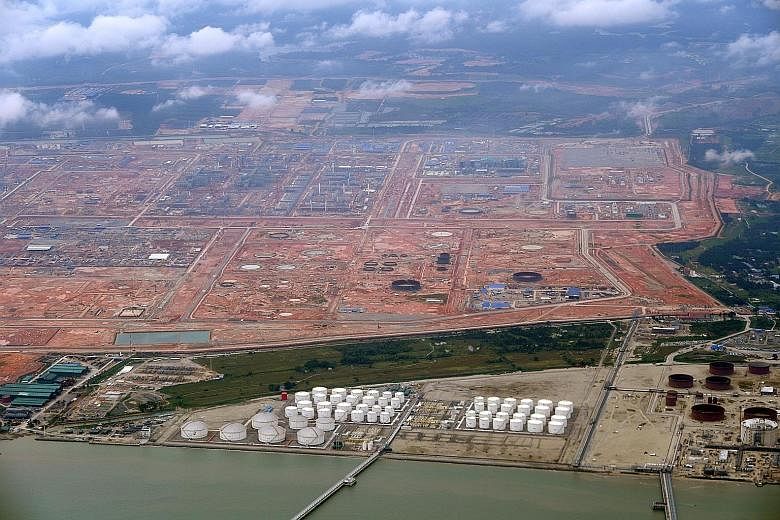The decision by the Saudi Arabian Oil Company (Saudi Aramco) to pull out from a multibillion-dollar petrochemical project in Johor with state-owned Petronas has exposed cracks in Muslim Malaysia's decade-old push to attract capital from the Middle East.
Early last week, Malaysia's Second Finance Minister Johari Abdul Ghani confirmed international news reports that Saudi Aramco had decided to withdraw from the US$27 billion (S$38 billion) refinery and petrochemical joint-venture development in Pengerang, Johor.
Mr Johari gave no reasons for Saudi Aramco's pullout, but he emphasised that it would not impact the project because Petronas has the financial muscle to proceed with the petrochemical venture.
There is little doubt among oil industry executives that the project, which is central to Malaysia's plans to rival Singapore as a regional oil and gas processing hub, will go ahead as planned.
But Saudi Aramco's surprise decision to axe its Malaysian plans has added to a growing list of troubles Malaysia is facing with investors from the Middle East, who are also facing financial problems because of the slump in oil prices.
In recent months, economic ties with Abu Dhabi, which has long ranked as the Arab world's most aggressive investor in Malaysia, have hit the skids over a dispute stemming from the financial debacle at state-owned 1Malaysia Development Berhad (1MDB).
Abu Dhabi's International Petroleum Investment Company is demanding US$6.5 billion from the Malaysian state fund after it defaulted on a multibillion-dollar financial assistance arrangement.
The dispute has gone into arbitration and, since then, Abu Dhabi's state-owned entities have withdrawn their involvement from several planned real estate projects in Malaysia, such as the development of a financial hub in the Iskandar region in Johor and the 1MDB-led Tun Razak Exchange project in the capital city of Kuala Lumpur.
Malaysia has long relied on foreign investment to drive its economy and the push to attract capital and tourists from the Middle East began under former premier Abdullah Ahmad Badawi, who succeeded Tun Mahathir Mohamad in late 2003.
At the time, the oil-rich Middle East countries were shunning the West following the Sept 11, 2001 attacks by militants on the United States and Malaysia emerged as a natural fit because of its Muslim credentials and stable politics.
More than a decade later, results from this push to attract Arab capital are mixed.
Malaysia's banking sector has benefited from the presence of three Middle Eastern financial institutions that have set up base in the country.
The country is also a popular destination for Middle Eastern tourists, who take advantage of the weakening local currency and the relatively cheap shopping compared with Singapore.
But larger ventures have not worked out so well.
For example, the Malaysian government wanted Middle Eastern investors to take the lead in the development of the Iskandar region in Johor, particularly in Medini, a 930ha mixed-use development that would feature a financial district envisioned as a hub for global Islamic finance.
The project attracted big names such as Kuwait Finance House, Abu Dhabi's state-owned Mubadala Development Group and Aldar Properties, another real estate developer in Abu Dhabi.
But Arab involvement in Medini quickly fizzled out after the 2008 global financial crisis and the investments were subsequently taken over by private Malaysian interests.
Other big-ticket Arab-led projects in Malaysia that have been quietly axed in recent years include plans by Abu Dhabi business groups to invest in a US$7 billion oil storage facility in Johor, and a US$4.2 billion aluminium smelter project in Sarawak.
Abu Dhabi investors have also pulled out from 1MDB's multibillion-dollar Tun Razak Exchange real estate development on the fringes of Kuala Lumpur.

